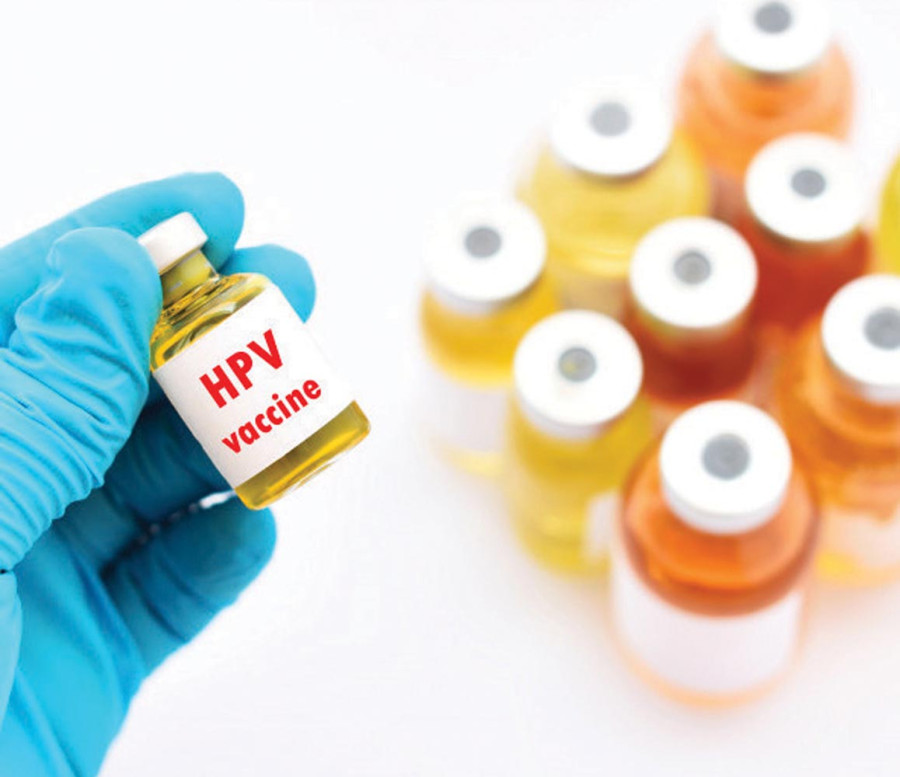Health
Nepal to roll out HPV vaccine next year
Human papillomavirus causes cervical cancer, which is a major cause of death among women in Nepal, doctors say.
Arjun Poudel
The Ministry of Health and Population has completed the process to buy a vaccine against human papillomavirus. The virus causes cervical cancer, which is the second most common cancer in the developing world and a major cause of death among Nepali women. The government plans to administer the vaccine to the target population in 2023.
All technical processes including the selection of suppliers have been completed and authorities are working to place an order for vaccine doses, officials said.
“It may take two to three months for the vaccine to arrive in Nepal,” said Dr Sarbesh Sharma, director of the Management Division under the Department of Health Services.
Human papillomavirus (HPV) is a viral infection that spreads through skin contact. Experts say early treatment prevents up to 80 percent of cervical cancer.
The World Health Organisation says HPV vaccination is recommended as part of a coordinated and comprehensive strategy to prevent cervical cancer and other diseases caused by the HPV.
“Separate training is needed for health workers to administer the vaccine,” Dr Bibek Kumar Lal, director at the Family Welfare Division, told the Post. “We will try to administer the vaccine doses at the earliest to the target population once the doses arrive.”
HPV vaccination was also mentioned in the government’s policy and programme for the fiscal year 2021-022, but the budget was not allocated accordingly.
Authorities had planned to administer the vaccine doses from any nine districts at the initial stage and expand it to other districts also.
Doctors say most cervical cancers are associated with the HPV, a sexually transmitted infection. Widespread immunisation with the HPV vaccine could reduce the impact of cervical cancer and other cancers caused by the HPV worldwide.
Bhutan, Sri Lanka, Thailand and the Maldives have introduced HPV vaccines nationally, while India and Indonesia have introduced them in some districts.
Nepal in 2016 piloted HPV vaccine in Chitwan and Kaski districts. All girls aged between 11 and 13 years were inoculated with two doses of the HPV vaccine during the pilot programme.
In 2019, the Health Ministry had allocated Rs77.7 million—Rs27.5 million to the immunisation section and Rs50 million to the BP Koirala Memorial Cancer Hospital in Bharatpur—to introduce the vaccine.
Nepal has also requested the Global Alliance for Vaccine and Immunisation (GAVI) to provide the HPV vaccine for free so that the government could be included in the regular immunisation list.
Officials, however, said chances of Nepal getting the vaccine from GAVI in 2023 are slim due to a growing demand for the vaccine worldwide. Currently, only two companies produce WHO-prequalified HPV vaccines.
The Health Ministry had also sought help from the World Health Organisation during a visit of the Director General of the UN health body Dr Tedros Adhanom Ghebreyesus in April to introduce the HPV vaccine to the regular immunisation list.
It is estimated that hundreds of women are diagnosed with cervical cancer every year in Nepal.
According to the BP Koirala Memorial Cancer Hospital in Bharatpur, over 700 women suffering from cervical cancer seek treatment at the hospital every year.
“We can save the lives of hundreds of women every year if we administer the HPV vaccine to all young girls,” Dr Jageshwar Gautam, a consultant gynaecologist, told the Post. “Countries which have included HPV vaccine in the regular immunisation list have successfully reduced cervical cancer in women.”
The government provides free screening for cervical cancer from state-run health facilities across the country.
The World Health Organisation says the HPV is responsible for over 70 percent of cervical cancer cases in women.




 9.7°C Kathmandu
9.7°C Kathmandu















